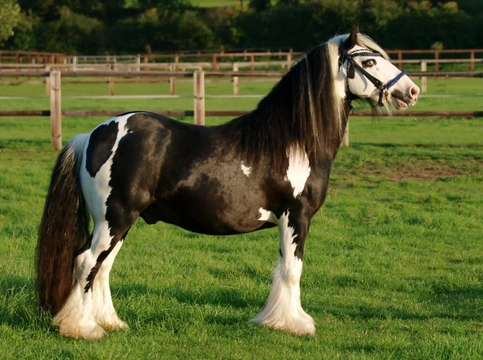
Traditional Gypsy Cobs, what is all the fuss about?
For many years, coloured horses were just not fashionable. Associated with the traveller community, no-one wanted a piebald or a skewbald and a horse of colour was positively frowned upon. How times change!
There are modern sports horse stallions who have been about for some years now who were specifically chosen for their ability and performance and their colour and this fashion for colour has finally filtered down to the humble cob if indeed it ever went away.
There are two societies representing coloured horses, the BSPA - British Skewbald and Piebald Association – and CHAPS – the Coloured Horse and Pony Society and they have both been in existence for some years. Their showing classes recognise all the different types of coloured horse namely, ponies, cobs shown hogged and without feather, traditionals shown with feather and long manes and tails and modern sports horses. And so it wasn’t rocket science to anticipate that the growing popularity in cobs and the increasing fashion for coloured horses might lead to the birth of yet another organisation, the Traditional Gypsy Cob Association, TGCA.
What is the TGCA?
Thought by many to be just a mixed type, the Traditional Gypsy Cob is actually recognised as a breed and they don’t all have to be coloured either – solid colours are included although clearly, the coloured cobs are amongst some of the most popular.
The TGCA was set up in 2005 to protect and preserve traditional Gypsy Cobs and their ancestry by identifying and recording old bloodlines and also implementing forward-thinking breeding practices. Rigorous DNA testing is used to establish parentage and lines and breeding is only encouraged from the best stock. The plan is to promote the gelding of inferior quality horses and those with less relevant or unknown ancestry and to try and begin a process to curtail the commonly found practice in the traveller community of maintaining horses as entire.
What does the TGCA do?
Apart from registering horses and providing information about the breed, the TGCA run their own shows and performance classes including showing, dressage and jumping. In 2012, only seven years after their creation, TGCA held 130 breed shows across the UK culminating in their own championship, TOYS – the Traditional of the Year Show. Not resting on their competitive laurels, the TGCA have introduced the sport of ‘Tradball’ which is the sport of horseball but for traditional cobs.
Untold benefits
The TGCA was founded with a strong conscience. Many of the animals that are the victim of indiscriminate breeding are cobs and it is no coincidence that a high percentage of equines who find their way into rescue centres are of this type.
‘Giving a cob a job’ is one of the mantras of the TGCA founder, Andrea Betteridge, hence all of the different disciplines that TGCA offers other than just mainstream showing. By encouraging the use of these horses and providing shows and classes for them this certainly makes an impact on the numbers of unwanted horses and ponies. The Association has also made a point of celebrating and promoting geldings, running classes and awards specifically for them. Stallions have always held sway in the show ring, in any breed, so this is a revolution indeed. By encouraging owners to consider a gelding rather than a stallion, this again puts a brake on the numbers of cobs out there and possibly helps to reduce the number of unwanted animals.
The TGCA were given a slot to present information about their society at the recent World Horse Welfare Annual Conference in London held on the 31st October 2018. This was because the identification, control and regulation of gypsy cobs will have an impact on the numbers coming forward to welfare centres across all the different charities in the equine sector. Like many breed societies, the speaker was passionate about the breed and preserving traditional bloodlines. The TGCA is also very keen to remove indiscriminate breeding and unlike other breed societies, has active policies in place to discourage this and plenty of other measures to ensure that these horses have a valid role. The insistence on the use of modern DNA techniques was also rather striking. Many other breed societies could learn a thing or two from the TGCA.
So why have a traditional?
These horses are versatile, hardy and usually fun to ride but with steady and equable temperaments. This makes them suitable for a range of leisure activities and they are not too big either. There is a market for these horses abroad particularly in the US so some stallions can make very big money but generally, the horses are quite affordable. And the great thing is that you and your cob can be part of a very forward-thinking and progressive organisation with lots on offer to keep you busy.



